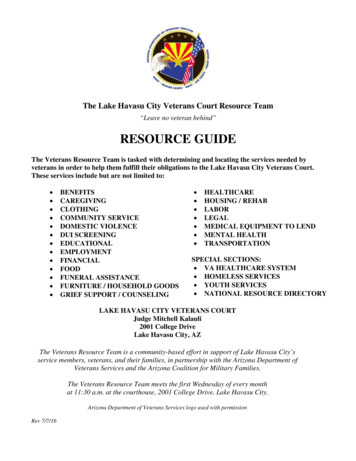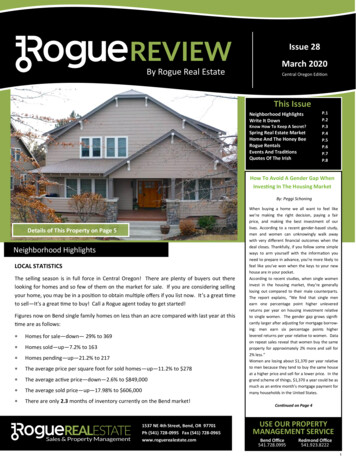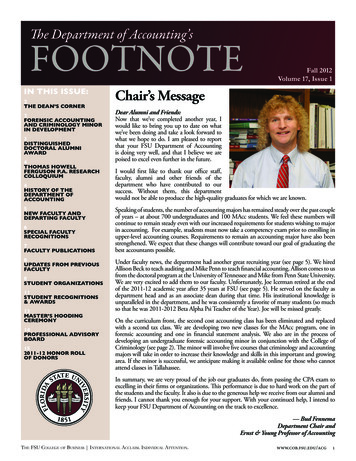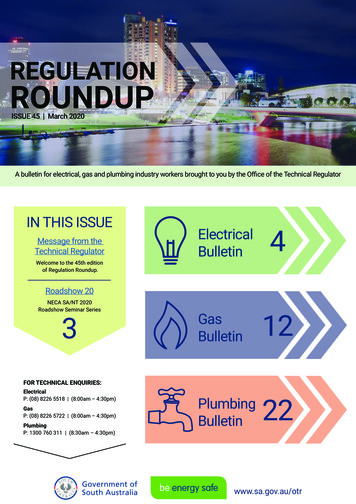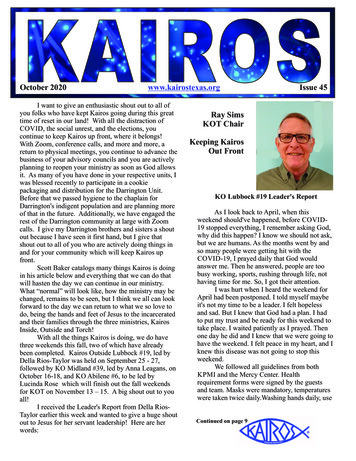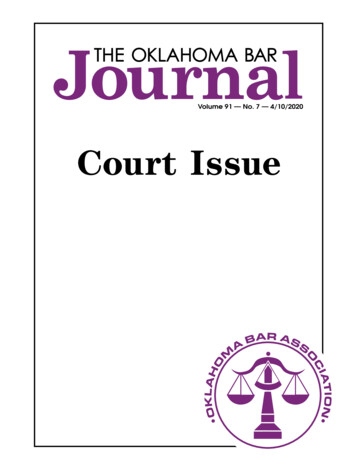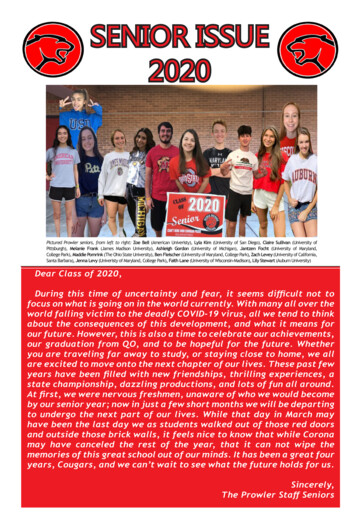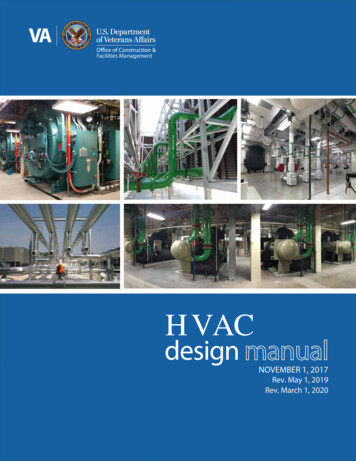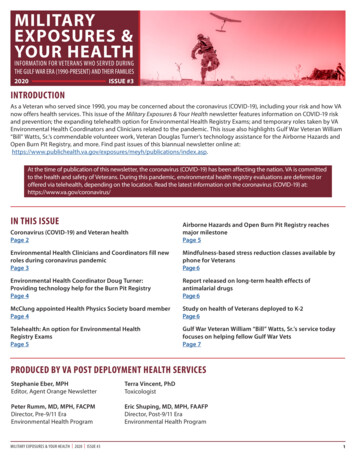
Transcription
MILITARYEXPOSURES &YOUR HEALTHINFORMATION FOR VETERANS WHO SERVED DURINGTHE GULF WAR ERA (1990-PRESENT) AND THEIR FAMILIES2020ISSUE #3INTRODUCTIONAs a Veteran who served since 1990, you may be concerned about the coronavirus (COVID-19), including your risk and how VAnow offers health services. This issue of the Military Exposures & Your Health newsletter features information on COVID-19 riskand prevention; the expanding telehealth option for Environmental Health Registry Exams; and temporary roles taken by VAEnvironmental Health Coordinators and Clinicians related to the pandemic. This issue also highlights Gulf War Veteran William“Bill” Watts, Sr.’s commendable volunteer work, Veteran Douglas Turner’s technology assistance for the Airborne Hazards andOpen Burn Pit Registry, and more. Find past issues of this biannual newsletter online publications/index.asp.At the time of publication of this newsletter, the coronavirus (COVID-19) has been affecting the nation. VA is committedto the health and safety of Veterans. During this pandemic, environmental health registry evaluations are deferred oroffered via telehealth, depending on the location. Read the latest information on the coronavirus (COVID-19) at:https://www.va.gov/coronavirus/IN THIS ISSUECoronavirus (COVID-19) and Veteran healthPage 2Airborne Hazards and Open Burn Pit Registry reachesmajor milestonePage 5Environmental Health Clinicians and Coordinators fill newroles during coronavirus pandemicPage 3Mindfulness-based stress reduction classes available byphone for VeteransPage 6Environmental Health Coordinator Doug Turner:Providing technology help for the Burn Pit RegistryPage 4Report released on long-term health effects ofantimalarial drugsPage 6McClung appointed Health Physics Society board memberPage 4Study on health of Veterans deployed to K-2Page 6Telehealth: An option for Environmental HealthRegistry ExamsPage 5Gulf War Veteran William “Bill” Watts, Sr.’s service todayfocuses on helping fellow Gulf War VetsPage 7PRODUCED BY VA POST DEPLOYMENT HEALTH SERVICESStephanie Eber, MPHEditor, Agent Orange NewsletterTerra Vincent, PhDToxicologistPeter Rumm, MD, MPH, FACPMDirector, Pre-9/11 EraEnvironmental Health ProgramEric Shuping, MD, MPH, FAAFPDirector, Post-9/11 EraEnvironmental Health ProgramMILITARY EXPOSURES & YOUR HEALTH 2020 ISSUE #31
CORONAVIRUS (COVID-19) ANDVETERAN HEALTHVA is committed to protecting andcaring for Veterans during the COVID-19pandemic. VA offers online resources1to keep you up-to-date on the latestinformation regarding COVID-19, andyou can check with your local VAmedical center2 for current proceduresregarding obtaining care. VA ispartnering with other federal agencies,such as the Centers for Disease Controland Prevention (CDC), to monitor theoutbreak of the virus. Frequent hand washing for at least20 seconds Avoiding touching your face Keeping six feet of space betweenyourself and others Covering your coughs and sneezes Wearing a face mask to protectothersARTICLE ions/people-with-medicalconditions.html Cleaning and disinfecting frequentlytouched v/preventFind more prevention tips from the CDC 4. getting-sick/prevention.htmlVA Health ServicesTo protect Veterans’ health and safety,VA is currently deferring environmentalhealth registry5 evaluations at manyVeterans have the same risk forcoronavirus infection and illness severity locations or offering them via telehealth,depending on the location. To find outas the general population, based onabout environmental health registrythe current understanding of thisexams nearest you, contact your localvirus. Simply being a Veteran does notEnvironmental Health Coordinator6.increase your risk. According to theTo find out the latest information onCDC, those who may be at higher risk3operating status and care at your localfor more severe complications fromVA medical center, review your local VACOVID-19 include:medical center2 web page. Adults age 65 or overCOVID-19 and Veteran a.gov/WARRELATEDILLNESS/AHBPCE/index.asp Smokers Those who reside in a nursing homeor long-term care facility Those who have an underlyinghealth condition, such as chroniclung disease, asthma, or breathingproblems (see information box) Those who have a serious heartcondition, diabetes, severe obesity,chronic kidney disease, or liverdisease or have a compromisedimmune system (such as from animmune disease or those who takeimmune weakening medicines)COVID-19 PreventionTo prevent coronavirus infection,Veterans should follow the precautionsrecommended by the CDC, including:novel coronavirusAirborne hazards and coronavirusSome Veterans report deployment exposures to respiratory irritants, such as smokefrom burn pits7, oil fires, explosives, or sand and dust storms. These exposures maycause symptoms, including irritation of the sinuses, mucous membranes, and therespiratory tract.Studies have shown that those diagnosed with an underlying lung disease, such asasthma, COPD or chronic bronchitis, regardless of cause, may be more susceptibleto respiratory illnesses and may place individuals at higher risk for severe COVID-19illness.VA has been communicating with Veterans and Service members who initiated orcompleted the Airborne Hazards and Open Burn Pit Registry8 questionnaire throughemail, providing resources and suggesting actions to take during the coronaviruspandemic. VA also modified its initial letter to registry participants to addressCOVID-19.In addition, the VA Airborne Hazards Burn Pit Center of Excellence9 is conducting astudy to investigate whether previous exposure to airborne hazards experienced bycombat Veterans makes them more susceptible to developing more severe COVID-19illness.2
ENVIRONMENTALHEALTH CLINICIANS ANDCOORDINATORS FILL NEWROLES DURING CORONAVIRUSPANDEMICMany Environmental Health Cliniciansand Coordinators took on new rolesto address the coronavirus (COVID-19)1pandemic. They provided safe andorganized COVID-19 testing, took newclinical positions to treat Veterans,managed the reassignments of medicalcenter staff, and monitored medicalstaff health; many while continuingto manage previous duties. Below aresome of the new roles that dedicatedVA Environmental Health Clinicians andCoordinators across the country took inthe early months of the pandemic.Dr. Moore has returned to her usualposition.Staff Reassignments to Carefor Veterans“The Southern Arizona VA Health CareSystem in Tucson, Arizona VA hassent one medical doctor, one nursepractitioner, and two medical supportassistants to the Labor Pool/COVID-19task force,” said Boaz Rabin, MD, FACP,Clinical Director, Compensation andPension Department, Southern ArizonaVA Health Care System.from my area doing employee healthCOVID tracking, where we make clinicaldecisions regarding the care and followup of employees who are suspected asbeing COVID-positive,” she said.Nancy Raml DNP, FNP-BC, MedicalExaminer, Compensation & Pension,and Environmental Health RegistryClinician, Zablocki VA Medical Center,Milwaukee, WI, has been trainedto perform pre-employee healthphysicals to assist with the rapidintake of the new health care workers.“I have assisted with processing N95mask requests, reviewing employeehazardous drug questionnaires, andworking in the Staffing ResourceTeam (which reallocates staff to meetthe daily COVID-related needs ofthe medical center) pool, screeningemployees’ temperatures, assistingin the emergency departmenttransporting COVID-19 test samples tothe lab, and transporting emergencyroom patients to radiology for imagingand to the inpatient units if admitted,”she said. During this assignment, shestill responds to Veterans’ registryquestions via email or telephone. In lateJune, she began conducting in-personenvironmental health registry examsagain with the facility’s leadership anddirection.The VHA Compensation and Pension/Environmental Health Department atthe Fargo VA Medical Center reassignedthree providers to other services as apart of their site’s COVID-19 response.Jackie Steckler, PA-C, was assigned toRheumatology, Andrea MiddlesteadDNP, NP-C, was assigned to Cardiology,COVID-19 Drive-Through Testingand Keith Fischer, MD was assigned as aAnisa Moore, MD, who is Section Chief of hospitalist. “All three providers returnedthe Environmental Health Departmentto their regular roles in late June,” saidat VA Eastern Colorado Health CareCarol Ness, MD, C&P/EnvironmentalServices and Lead EnvironmentalHealth, Fargo VAMC.Health Clinician for Veterans IntegratedHelping Health Care WorkersService Network 19, worked as MedicalDirector of the COVID-19 Clinical TestingKatia Gugucheva, MD, EnvironmentalCenter at the Rocky Mountain RegionalHealth Clinician with the Orlando VAVA Medical Center (VAMC) COVID-19Medical Center, has been detailed todrive-through test site. Drive-throughoccupational health screening andtesting allows hospitals to minimizefollowing VA employees who have been ARTICLE LINKS:contamination and streamlines theexposed to Veterans (patients) who1. https://www.publichealth.va.gov/ntesting process; if patients are tested intested positive for COVID-19. “We follow coronavirus/index.aspa clinic or hospital room, the room can’tthe CDC recommendations for thesebe used for at least two hours while it isexposed employees and do our bestdecontaminated.to monitor and take care of them thebest we can,” said Gugucheva. “Theyexpress to me genuine gratefulness forwhat the VA, as an employer, is doing forthem, and they feel safe that the VA willcontinue to care for them if they becomevery ill,” she said.Andrea Middlestead DNP, NP-CMILITARY EXPOSURES & YOUR HEALTH 2020 ISSUE #3Terri Dymeck, NP, Northern Arizona VAHealth Care System, normally conductsEnvironmental Registry Exams andworks in Compensation & Pension as anurse practitioner. “I have been detailedTeam members document the vital signs in theComputerized Patient Record System (CPRS), wipedown the machines in between patients, and ferrythe specimens to the lab.3
ENVIRONMENTAL HEALTHCOORDINATOR DOUG TURNER:PROVIDING TECHNOLOGYHELP FOR THE BURN PITREGISTRYThe Airborne Hazards and Open BurnPit Registry1 is a web-based registry inwhich Veterans with service in certainlocations from 1990 to the present candocument their deployment exposuresand their health concerns. They can thenschedule an in-person health exam.Since the questionnaire is onlyavailable online, some Veterans findthat they need help with the technicalaspects of the registry. Douglas Turner,Environmental Health Coordinator at theVA Pittsburgh Healthcare System*, hasassisted local Veterans.“I’ve helped dozens of people with theburn pit registry, although most gothrough it pretty well on their own,”said Turner, a Veteran who served in theArmy between 1977 and 1980 and in theactive Army reserve until 1986. He hashelped people on the phone, via email(without sending personal protectedinformation), and in person. “They’revery appreciative,” said Turner.For Veterans without computer access,Turner has directed them to the VAlibrary’s free public access computersand even sat down with them to helpwith questions.Turner has helped Veterans getapproved to participate in the burn pitregistry when it initially didn’t showtheir qualifying deployment. Sometimes,there is missing or inaccurateinformation in Department of Defense’s(DoD) deployment database eventhough Veterans are eligible, particularlyfor Veterans who were deployedbefore 9/11, for special forces, or thosere-deployed within three months.Veterans may need to select “Request anEligibility Review” within the registry fora manual review of their service.Where to go for technical help with the registry The registry help desk provides support from 8 a.m. – 8 p.m.Eastern Time at 1-877-470-5947. The registry FAQ answers questions about the DS Logon; printing,emailing, and saving the questionnaire; internet browsers andoperating systems; and website maintenance issues. For help with your DS logon, call the Defense Manpower DataCenter Support Center at 1-800-477-8227. Contact your Environmental Health Coordinator3 nearest you. Yourcoordinator can also help you schedule an in-person exam.Turner is also committed to helpingMCCLUNG APPOINTEDVeterans schedule a follow-upHEALTH PHYSICS SOCIETYexam. Veterans need to contact anEnvironmental Health Coordinator to set BOARD MEMBERup a health exam after completing theDanny McClung, BS, RRPT, healthquestionnaire.physicist and radiological consultant forIf you need technical help with the burn VA’s Post Deployment Health Servicespit registry, you can call 1-877-470(PHDS), has been appointed as a board5947. The registry FAQ2 answers manymember of the Academic, Industrial, andquestions. Most of all, remember yourResearch Radiation Safety Section ofEnvironmental Health Coordinator3 is a the Health Physics Society. Mr. McClunggreat resource for help.also received the 2020 John C. Taschner*At the time of publication, Doug Turner Leadership Award from the HealthPhysics Society for his contribution tohas left his position as EnvironmentalHealth Coordinator at the VA Pittsburgh health physics while in military serviceand for his service to the general publicHealthcare System.in contributing to the relationshipARTICLE LINKS:between the military, VA, and the health1.https://www.publichealth.va.gov/physics profession. The Health Physicsexposures/burnpits/registry.aspSociety is a scientific organization ofradiation safety professi
Gulf War Veteran William “Bill” Watts, Sr.’s service today focuses on helping fellow Gulf War Vets. Page 7 Stephanie Eber, MPH Editor, Agent Orange Newsletter. Peter Rumm, MD, MPH, FACPM Director, Pre-9/11 Era . Environmental Health Program. PRODUCED BY VA POST DEPLOYMENT HEALTH SERVICES. Terra Vincent, PhD. Toxicologist Eric Shuping, MD, MPH, FAAFP
